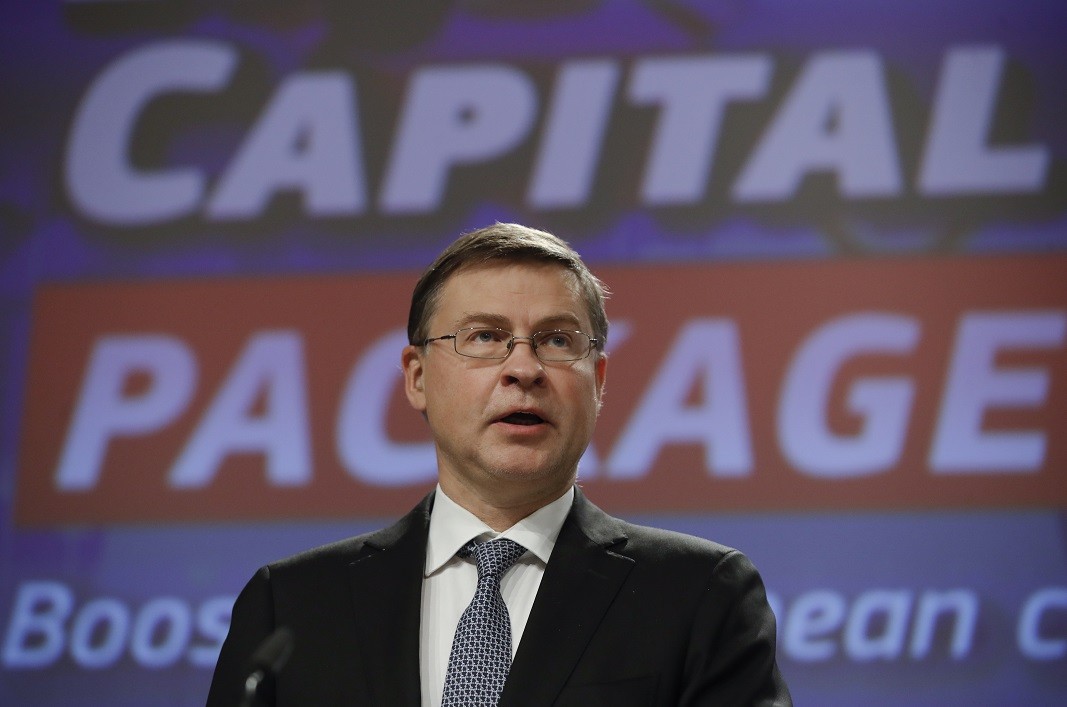At the end of November, the European Commission adopted a package of measures to improve the ability of companies to raise capital across the EU and to ensure that Europeans receive the best offers for their savings and investments. At a special press conference, the Executive Vice-President of the European Commission and EU Commissioner for Trade Valdis Dombrovskis and the European Commissioner for Financial Services, Financial Stability and the Capital Markets Union Mairead McGuinness presented the actions the EC would take next year to establish a Capital Markets Union (CMU).
“A year ago, we presented an action plan to boost the Capital Markets Union. Today, we are taking another major step forward to put that plan into effect”, said Commissioner Dombrovskis:

„Deep integrated and well-functioning capital markets play a large part in determining the strengths of our recovery. This means they should help smaller companies get off the ground and later expand, and larger companies to thrive, make it easy for people to invest safely in their future, and integrate national capital markets into a general single market.At the same time as we embark into green and digital transformations, we need to generate massive investments to make EU economy more resilient. So today’s package of proposals will attract and protect investors, improve their access to company and trading data, increase sources for financing and make it easier for smaller businesses to find funding, and boost Europe’s global competitiveness as a place to invest and do business”.
One of the main proposals is the creation of a European Single Access Point (ESAP) for public information related to the finances and sustainability of EU companies and for information on EU investment products. Another important proposal is to increase the transparency of capital markets for both retail and institutional investors by introducing a “European consolidated tape” for easier access to real-time data on trading in stocks, bonds and derivatives in al EU capital markets. It will bring together information from 476 exchanges and trading venues, Dombrovskis explained, adding that the new rules aim to make stock exchange trading more transparent, which would increase the EU's attractiveness for investing in capital markets.

Another proposed change, which also affects retail investors, is the promotion of long-term investment through the European Long-Term Investment Funds (ELTIFs). These funds are not currently being used to their full potential, Dombrovskis said. The aim is to make the ELTIFs more attractive to investors, as well as to make it easier for retail investors to invest in the EFDI, in particular by removing the minimum investment threshold of € 10,000, while ensuring strong investor protection.
But that's not all. Commissioner Mairead McGuinness has announced even more ambitious initiatives expected in 2022 to move closer to the goal of creating the EU’s Capital Markets Union:

“Lookingtothefuture, because the Capital Markets Union has been for some time in the making, it is a step-by-step approach, today’s announcement is important but next year we will add to our work. Looking at the listing review, we would like to encourage more companies to list on the European public markets, particularly SMEs. We are also going to come forward with an initiative to harmonize some corporate insolvency rules, making it easier to predict the outcome of insolvency proceedings across the EU, a particularly important issue for cross-border investors. We also want to focus on financial education. We want our citizens to be financially literate, to be confident enough to ask the right questions, and to know what products will work for them. And in that regard we are working on a financial literacy framework so we could empower all citizens.”
In Bulgaria, numerous state-run programs and a number of private initiatives have already been implemented aimed at improving the financial literacy of Bulgarian citizens. Analyzes regarding financial literacy show that Bulgaria is slightly above the average level for the region (Romania, Croatia, North Macedonia, Montenegro, Moldova and Georgia), but below the average level for EU member states, according to a survey of the Bulgarian Ministry of Finance.
English version Rositsa Petkova
Photos:EPA/BGNES, pixabayThe head of the regular mission of the International Monetary Fund in Bulgaria, Jean-Francois Dauphin, has presented the results of the review of the Bulgarian economy and financial system . The fund's mission began on March 6 and ends today...
Monthly inflation was 0.3 per cent in February, the National Statistical Institute (NSI) said. Bulgaria's annual consumer price index (CPI) recorded inflation of 3.3 per cent in February, down from 3.8 per cent in the previous month. It was the 14th..
Bulgaria's gross domestic product grew by 1.8 per cent to BGN 183.7 billion (EUR 93.9 billion) last year, according to preliminary data released by the National Statistical Institute. One person accounts for BGN 28 516 (EUR 14 580) of the total...
“We are a guarantee of stability in the region,” caretaker Prime Minister Dimitar Glavchev states in an address to the Vienna Economic Forum - Sofia..

+359 2 9336 661
